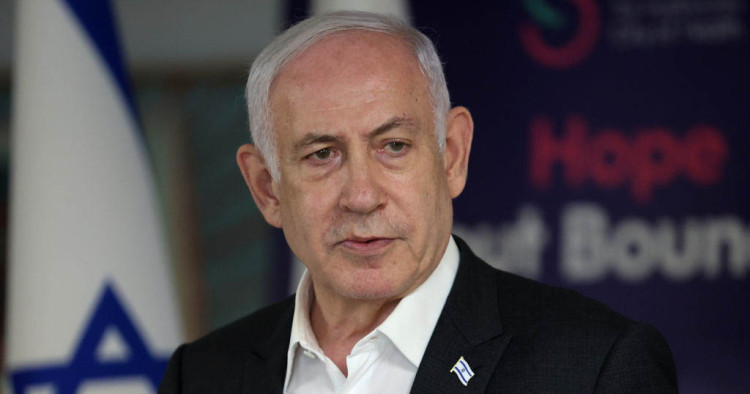Contents:
- Netanyahu’s awkwardly timed visit to Washington
- The contours of US policy in the Middle East remain unchanged despite major domestic political shifts in America
- Houthi attack on Tel Aviv: Unseen impacts and geopolitical ramifications
- Houthi drone strike on Tel Aviv illustrates unstoppable "democratization" of high-technological capabilities
- Baghdad seeks more flexibility from Washington
- ICJ concludes that Israeli occupation of Palestinian territories is illegal
Netanyahu’s awkwardly timed visit to Washington
Nimrod Goren
Senior Fellow for Israeli Affairs

-
Even before the political drama in the United States unfolded, it was not clear why Israeli Prime Minister Benjamin Netanyahu had been invited to Congress and the White House before delivering on a cease-fire deal in Gaza.
-
Netanyahu is likely to use the visit to advance his own domestic political needs, enhance US support for Israel, and prepare the groundwork for the next American administration — not necessarily to advance any diplomatic breakthroughs in the Middle East.
The timing of Israeli Prime Minister Benjamin Netanyahu’s visit to Washington, DC, this week was contested even before the recent political drama in the United States unfolded. For some Israelis and Americans alike, it was awkward to see Netanyahu receive a bipartisan invitation to address Congress and an invitation to the White House — which he so much wanted — prior to reaching a Gaza cease-fire and hostage release deal.
The withdrawal of President Joe Biden from the presidential race, in proximity to the visit, adds a new dimension. It overshadows Netanyahu’s trip and will probably change its dynamics, creating a gap between the importance attributed to the visit in Israel and the more limited interest it may now generate in Washington.
Prior to Netanyahu’s departure from Israel, he did not give indications of any innovative headlines or diplomatic breakthroughs his visit could produce. Instead, the prime minister seemed to be geared toward reinforcing his recurring messaging about the war in Gaza, Israel’s security, and the Israeli-US alliance.
Nevertheless, such a visit is an important occasion for Netanyahu, who may hold some surprises up his sleeve. Factors to watch, as the visit takes place, include domestic Israeli politics, US support for Israel, upcoming administration changes, and diplomatic progress in the Middle East.
As for domestic Israeli politics, Netanyahu arrives in Washington a few days before the Knesset goes on a long and criticized recess, until late October, during which time the coalition cannot be dissolved. Thus, any controversial steps Netanyahu may decide to take after the visit will not pose an immediate threat to his government. Netanyahu hopes the White House meeting and address to Congress will give him a public opinion boost, as a constant majority of Israelis seeks early elections and new leadership.
Before leaving for Washington, Netanyahu stated his goal would be to publicly recognize and help enhance US assistance to and backing of Israel. He plans on thanking President Biden for his support for Israel and to make the case that Israel is America's most important ally. Netanyahu will present to Congress his post-Oct. 7 narrative, acknowledging that, in the near future, Israel might need additional political, security, and legal US support in light of possible regional escalation and international pressure.
With an eye to an upcoming administration change in the US, Netanyahu would like to showcase that he can have good working relations with whomever is elected president. Thus, a meeting with Vice President Harris — the current front-runner to replace Biden on the Democratic ticket — is important; but Netanyahu’s eyes are set on a possible meeting with Donald Trump. While probably hoping for a Republican victory in November, Netanyahu will want to dismiss claims that there are tensions between him and the former president.
Reaching diplomatic progress in the Middle East might unfortunately not be high on Netanyahu's agenda. Will he show willingness to reach a breakthrough in cease-fire talks? Or will he pose yet additional conditions for such a deal, as he did in recent months? Will he deliver some positive — even if vague — signal regarding prospects for a future Israeli-Palestinian two-state solution, to enable progress towards Israeli-Saudi normalization? Or will he once again deliver hawkish and uncompromising speeches, focusing on security threats to Israel and the West from Iran and its proxies?
In any case, the real outcomes of Netanyahu’s visit may become known only after his return to Israel. This will depend on whether Netanyahu will be ready to take bold diplomatic moves while the Knesset is in recess and on whether Biden will use his remaining months in office to put real pressure on all sides to end the war in Gaza.
Follow: @GorenNimrod
The contours of US policy in the Middle East remain unchanged despite major domestic political shifts in America
Brian Katulis
Senior Fellow for US Foreign Policy

-
The Biden administration and Congress prepare to receive Israel’s Prime Minister Benjamin Netanyahu at a time of extreme uncertainty and major shifts in US politics.
-
Meanwhile, Secretary of State Antony Blinken reiterated US policy goals on the Israel-Hamas war and Iran at a security forum.
The talk of the nation and the world has been President Joe Biden’s decision to end his re-election campaign and endorse Vice President Kamala Harris as the new Democratic Party nominee. What this shift means for US policy in the Middle East is not fully clear, but the Biden team is likely to stay the course it has set for itself on key Middle East issues.
Biden now has six months left in his presidency, and he may in fact spend more of his personal time on foreign policy, a strong interest and passion of his since he was in Congress and head of the Senate Foreign Relations Committee. With fewer demands from the campaign trail and fewer domestic policy issues to address with the current Congress, at least until the post-election lame duck session, Biden may seek to dedicate greater effort to shore up his foreign policy legacy.
This leadership transition inside of one of the United States’ two leading political parties comes at a busy and uncertain time for US foreign policy in the Middle East. As the Houthi drone attack against Tel Aviv and Israel’s retaliatory strike against the Houthis in Yemen this past week demonstrates, the clock doesn’t stop even when America’s collective political and policy attention is focused more inwardly. US military and diplomatic efforts in the Middle East remain quite busy given all of the unresolved issues in the region.
Israeli Prime Minister Benjamin Netanyahu’s visit to Washington, DC, this week, featuring a meeting with the Biden administration and an address to a joint session of Congress, will put the Middle East back in the spotlight at this busy and uncertain period in America. The political backdrop of Netanyahu’s visit in 2024 differs significantly from what it was when he made his last speech to a joint session of Congress, in 2015. Back then, America’s policy and political debate was more sharply focused on the Middle East, with issues like nuclear negotiations with Iran and the campaign against the Islamic State dominating the agenda. These days, there is a lot going on in the Middle East, but Americans aren’t as focused on that part of the world as they were nearly a decade ago. Netanyahu is likely to receive a warmer reception from Republicans than Democrats; but unless he has some surprise moves on the Israel-Hamas front, Lebanon, or Iran, the visit is not as likely to generate the same buzz as the one in 2015.
In advance of Netanyahu’s visit and amidst all of America’s domestic political turmoil, US Secretary of State Antony Blinken reiterated two key policy priorities on the Middle East while speaking at the Aspen Security Forum last week. On the Israel-Hamas war, Blinken restated the top priority of achieving a cease-fire and hostage release deal, something the Biden administration has been working with Qatar and Egypt to achieve for the last seven months since the last cease-fire collapsed. Using an American football analogy, Blinken said the talks are “inside the 10-yard line” and that America was “driving toward the goal line in getting an agreement that would produce a ceasefire, get the hostages home, and put us on a better track to trying [sic] to build lasting peace and stability.”
Blinken observed that a successful visit by Netanyahu this week would involve two things: first, bringing this cease-fire and hostage release deal across the “finish line,” and second, to make clear a “so-called day after plan” for Gaza, but also Israelis and Palestinians. Blinken restated the long-standing US policy goal of a two-state solution, which he said would be the “strongest possible rebuke to both Iran and Hamas.” Blinken made this statement just as Israel’s Knesset voted overwhelmingly to reject a two-state solution.
On a second important issue, Blinken reiterated that it is still “resolutely” US policy that Iran not be allowed to obtain a nuclear weapon. He also said that Iran probably now is “one or two weeks” away from “having the breakout capacity of producing [enough] fissile material for a nuclear weapon,” a dangerous tipping point.
Blinken’s statements calling for a two-state solution for the Israeli-Palestinian conflict and stopping Iran from getting a nuclear bomb serve as a reminder that the United States will need to craft and implement policies to achieve those goals and produce results, even at a time when other priorities are pulling America in many different directions.
Follow: @Katulis
Houthi attack on Tel Aviv: Unseen impacts and geopolitical ramifications
Fatima Abo Alasrar
Non-Resident Scholar

-
The Houthi attack on Tel Aviv and subsequent Israeli retaliation highlight the increasing sophistication of proxy warfare in the region, with Iran’s support for the Houthis exacerbating the conflict and complicating the security landscape for Gulf states and international actors like the United States.
-
The Houthis’ portrayal of widespread support for their actions is misleading, as they use repressive tactics, media manipulation, and humanitarian aid exploitation to maintain control, while genuine Yemeni public sentiment is overwhelmingly against them.
Following the July 19 Houthi attack on an apartment building in Tel Aviv, which killed one and injured several others, the Houthis orchestrated a large-scale demonstration, presenting it as a celebration of their military success against Israel as well as an endorsement by the Yemeni people and evidence of their support for Palestine. However, the reality is far more complex. The Houthis have long manipulated and coerced the masses, using their control over Yemen to project an image of widespread support that belies the true sentiments of the people. That control is maintained through a variety of repressive tactics, including the intimidation of dissenters, media manipulation, and exploitation of humanitarian aid.
Yemeni intellectuals and political parties vigorously challenge the Houthi misinformation that has permeated both Arab and international narratives of the conflict. Social media posts from political factions and independent voices highlight that the Houthis are not representative of the Yemeni people’s will instead exploit the conflict to maintain their power. One post by a human rights activist compared the aftermath of Sunday’s deadly Israeli counterattack on the port of Hodeidah with the extensive damage caused by Houthi attacks on Taiz, emphasizing that the Houthis do not care for the average Yemeni citizen and are seen as illegitimate entities. They thrive in the chaos, leveraging it to fortify their position while the general population suffers.
The internationally recognized Yemeni government has also unequivocally condemned both the Houthi actions and the Israeli retaliatory strikes on Hodeidah. The broader Arab position on the ongoing war in Gaza shapes the government’s stance. Yemen’s government is walking a tightrope, condemning the provocations of the Houthis while refraining from aligning with Israeli actions, which are widely condemned in the Arab world. This delicate balance reflects Yemen’s concern over the conflict becoming more intricate and the desire to navigate the crisis without further alienating key regional allies or exacerbating domestic instability.
From a geopolitical perspective, this escalation marks a significant turning point. The Houthis’ reckless actions and Israel’s swift retaliation will likely be repeated, as the Yemeni militant group aims to stretch the Israeli defenses thin. The Houthi attacks, facilitated by Iranian support, illustrate the increasing sophistication and reach of proxy warfare in the region. Tehran’s backing of the Houthis is part of its broader strategy to project power and influence throughout the Middle East, challenging both Saudi and Israeli interests. This proxy dynamic complicates the conflict raging in Yemen, dragging regional and global powers into a quagmire that extends beyond the immediate hostilities.
The Houthis perceive this escalation as advantageous because it reinforces the perception of Israel as a hostile force seeking to dominate Arab territories — a narrative they have long promoted. This perception serves to rally support and legitimize their actions, compelling individuals to align with their cause or face opposition, thereby facilitating forced recruitment and consolidating their control over the population
For the Gulf states, particularly Saudi Arabia and the United Arab Emirates, the Houthi threat is a direct security concern. The ongoing instability in Yemen poses risks to their own borders and maritime interests. The lack of a unified international stance on the Houthi issue, coupled with Russia’s reported weapons sales to the group, further exacerbates the regional security dilemma. The United States has a pivotal role to play in this conflict, needing to balance its support for Israel with its commitments to Gulf allies, while also addressing the broader strategic challenge posed by Iran.
The international community must grasp the complexity of the Yemeni situation. Genuine public sentiment is challenging to discern in such a repressive environment, and the apparent support for the Houthis’ actions against Israel is overstated given their violent hold on the country. A nuanced policy approach is crucial to address the conflict’s root causes and support the Yemeni people in their quest for peace and stability.
Follow: @YemeniFatima
Houthi drone strike on Tel Aviv illustrates unstoppable “democratization” of high-technological capabilities
Michael K. Nagata
Distinguished Senior Fellow on National Security

-
No defensive system is perfect, and the Houthis’ successful drone strike on a Tel Aviv apartment building will probably embolden future attempts.
-
Given the unstoppable global proliferation of capabilities like autonomous drones, artificial intelligence, high speed data processing, and ubiquitous communication, the challenge for the United States and like-minded governments is whether they can adopt and employ cutting-edge technology faster, more broadly, and more effectively than their adversaries can.
The recent Houthi drone attack on Tel Aviv, which struck an Israeli apartment building near the Embassy of the United States, killing at least one person, should surprise no one. And the fact Israel’s state-of-the-art air defense could not prevent it will probably embolden future attempts.
Of course, no defensive system is perfect. Given the enormous volume of rocket, missile, and drone attacks directed against Israel, it is inevitable that some percentage of them, launched by the Houthis, Hezbollah, or other Iranian-related factions, including Iran itself, will succeed. This recent attack also serves as a sharp reminder for those engaged in multi-national efforts to defend commercial shipping in the Red Sea that they cannot protect everything, as was the case recently with the successful Houthi strike on another Greek cargo vessel. Despite the international coalition’s ongoing and heroic efforts, inevitably some number of these technologically sophisticated attacks will find and strike lucrative targets.
All of this should serve as a powerful reminder to the US and all its allies that the ongoing emergence globally of dazzling new technologies, such as autonomous drones, is not just proliferating and expanding. Just as importantly, the costs of acquiring and employing such technology-based instruments as useful tools of war and influence is rapidly falling. The “barriers to entry” are diminishing everywhere, and any global actor can have access to weaponizable modern technology.
Indeed, the story of the “digital age” is largely about how ever more powerful tools (artificial intelligence, high speed data processing, ubiquitous communication, etc.) are becoming increasingly affordable for anyone who wishes to use them, and for any purpose. And as has been true since the dawn of mankind, any powerful tool that was originally intended for peaceful purposes is also very likely to be used as an instrument for advancing a security or military interest, including the interests of a malign actor. This unstoppable and ongoing “democratization” of global availability of dazzling new technologies will continue providing adversaries of Israel, the US, and all other countries a new and powerful set of tools for threatening their interests.
The sobering reality is that this trend is unstoppable because global technology proliferation is unstoppable. The challenge for the US and like-minded governments is whether they can adopt and employ cutting-edge technology faster, more broadly, and more effectively than their adversaries can. This race by all contestants, both friendly and adversary, cannot be stopped, it can only be won or lost.
Baghdad seeks more flexibility from Washington
Robert S. Ford
Senior Fellow

-
An Iraqi military delegation is due to visit Washington soon, and Iraqi Shi’a Islamist hardliners want the delegation to take a hard line on quickening the American troops’ withdrawal.
-
Iraqi Foreign Minister Fuad Hussein met in Washington with Treasury Under Secretary for Terrorism and Intelligence Brian Nelson on July 13 to urge the US to ease its sanctions, which have frozen some 30 Iraqi commercial banks’ access to dollars and the international banking system.
A flurry of activity in July serves as a reminder that the Iraqi government is trying to balance good relations with both the United States and Iran. On July 17, an Iranian-backed militia launched a small drone attack against an Iraqi airbase housing some of the 2,500 US troops deployed in the country. There were no casualties, but some observers in Iraq worry the attack suggests that the informal cease-fire Prime Minister Mohammed Shia al-Sudani arranged last February between the Iranian-backed militias and the Americans is fraying. The militias and their political allies in the Iraqi parliament suspect Washington is stalling in negotiations over the withdrawal of its forces from Iraq. Sudani has said the American-backed multinational coalition should withdraw all its forces, but he wants to establish a bilateral military support program with the US and some other countries. On July 8, a working-level Pentagon delegation had more discussions in Baghdad with Iraqi officials about the future of American military relations with Iraq, but there was no announcement about progress or a timetable for a withdrawal. Reflecting heat from the hardline Shi’a Islamists, a Shi’a politician told an Iraqi television station that an announcement about a schedule for withdrawal would come within weeks. Washington noticeably has said nothing about any timetable, giving Sudani no political cover. An Iraqi military delegation is due to visit Washington soon, and Shi’a Islamist hardliners want Iraq to take a tougher stance on quickening the American troops’ withdrawal.
Meanwhile, Iraqi Foreign Minister Fuad Hussein met in Washington with Treasury Under Secretary for Terrorism and Intelligence Brian Nelson on July 13 to urge the US to ease its sanctions, which have frozen some 30 Iraqi commercial banks’ access to dollars and the international banking system. Hussein argued that the Iraqi banking sector has undertaken reforms to address American concerns about the banks’ involvement in money laundering that benefits Iran and its proxies. The Treasury Department applauded Iraq’s commitment to reform but gave no hint that the sanctions would be eased. Hussein also met State Department Under Secretary for Political Affairs John Bass to seek help with respect to Iranian funds now frozen in Iraq; the State Department, however, also gave no public hint of flexibility.
On a more positive note for Baghdad, last week, the State Department said it had issued another four-month waiver to the Iraqi government to buy Iranian electricity without triggering American sanctions. The State Department’s spokesperson said Baghdad was making steady progress toward developing alternative sources to replace imports of electricity from Iran. The extreme heat in Iraq this summer has made boosting the provision of electricity more important than ever to Iraqis.
Follow: @fordrs58
ICJ concludes that Israeli occupation of Palestinian territories is illegal
Eyal Lurie-Pardes
Visiting Fellow

-
The International Court of Justice published an advisory opinion concluding the Israeli occupation of the West Bank, East Jerusalem, and the Gaza Strip is illegal and must be ended as soon as possible, as well as followed up by providing reparations to Palestinians.
-
Although the advisory opinion is nonbinding, its reverberations are likely to further impact how international governments approach trade, diplomatic relations, and military collaboration with Israel.
On Friday, July 19, the International Court of Justice (ICJ) published its long-anticipated advisory opinion on the legality of the Israeli occupation in the West Bank, East Jerusalem, and the Gaza Strip (examined together as the Occupied Palestinian Territories, OPT). For the first time, the ICJ reviewed the legality of the Israeli occupation as a whole rather than specific aspects of it, such as Israel’s establishment of a separation wall on Palestinian territory.
In an overwhelming majority, the ICJ judges ruled that Israel’s prolonged occupation is illegal and should be terminated as soon as possible as well as called on states and international bodies not to assist its continuation. According to the Hague Regulation of 1907, which is treated as binding customary international law, occupation is a legal action a party can exercise during conflicts as long as it is temporary and implemented according to international standards. The ICJ asserts that Israel has been treating the territory as a permanent part of the country rather than exercising temporary control necessary for security reasons. This annexation was partially de jure, by expanding the jurisdiction of Israeli law officially to territories such as East Jerusalem and Israeli citizens living in the illegal settlements there, and partially de facto, such as by repeatedly expanding settlements. The ICJ also lays out how the Israeli occupation is inconsistent with international law and violates Palestinians’ rights. Among other things, the ICJ considered how Israel’s enhanced settlement policy violates the obligation of the occupying power to not transfer its own population into the occupied area; moreover, the ruling highlights Israel’s exploitation of natural resources in the OPT to its own benefit, the excessive use of force against Palestinians living in the occupied areas, as well as the Israeli failure to protect them from settler violence. Furthermore, the ICJ states Israel is obliged to provide reparations for the damage inflicted on Palestinians due to the occupation.
The ICJ’s judges additionally determined that the Israeli occupation breached Palestinian rights under Article 3 of the International Convention on Racial Discrimination, which mandates states to condemn and prevent racial segregation and apartheid. Although the ICJ did not explicitly analyze whether Israel’s actions amount to the crime of apartheid, this initial determination could encourage efforts by human rights organizations to classify the Israeli regime, at least in the OPT, as apartheid.
The content of the ICJ advisory opinion is not surprising. Human rights organizations and international bodies have been reporting extensively for decades about the ongoing violations of Palestinians’ rights and the apartheid-like nature of the discriminatory treatment of Palestinians because of the two separate legal systems in the West Bank — one for Jews and another for Palestinians. Israeli governments under Prime Minister Benjamin Netanyahu drifted away from the formal policy of intentional ambiguity regarding the temporariness of its control over the West Bank, which Israel adopted following the occupation of the OPT in 1967. Instead, recent Israeli governments accelerated the annexation of the West Bank, enhancing settlement construction and expanding the implementation of Israeli law in the area.
Although the ICJ’s advisory opinion is nonbinding, its reverberations will increasingly impact how states and international bodies conduct trade, diplomatic relations, and military cooperation with Israel. Countries that wish to adhere to the ICJ conclusion will need to adjust their policy and more robustly separate their approaches toward the internationally recognized state of Israel on the one hand and its illegal occupation in the OPT on the other. For example, companies, international bodies, and countries could rely on the advisory opinion as a justification to demand that any collaboration with Israel not include Israeli entities from the OPT or ones that assist in the continuation of the occupation regime there.
Photo by Jack Guez -Pool/Getty Images
The Middle East Institute (MEI) is an independent, non-partisan, non-for-profit, educational organization. It does not engage in advocacy and its scholars’ opinions are their own. MEI welcomes financial donations, but retains sole editorial control over its work and its publications reflect only the authors’ views. For a listing of MEI donors, please click here.













